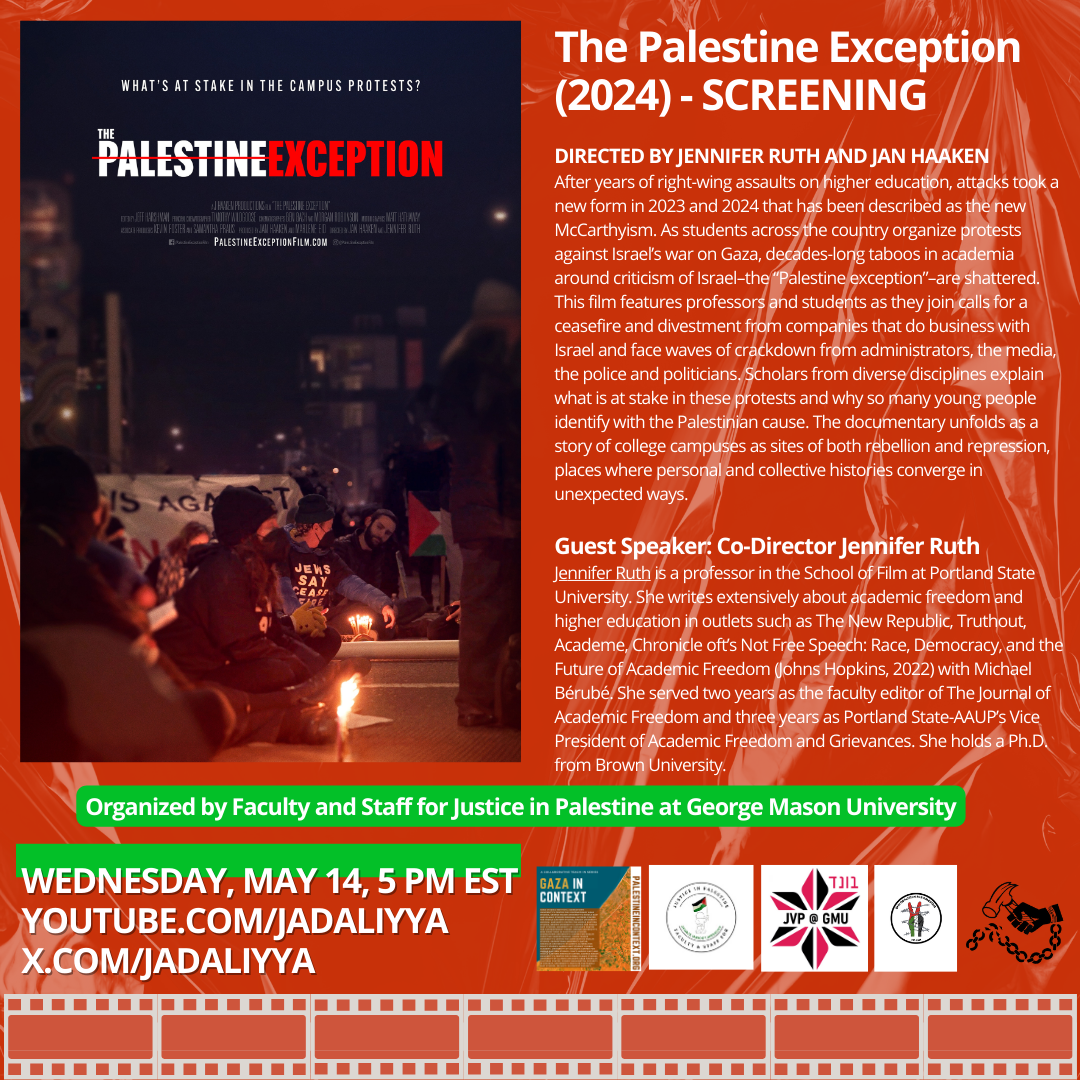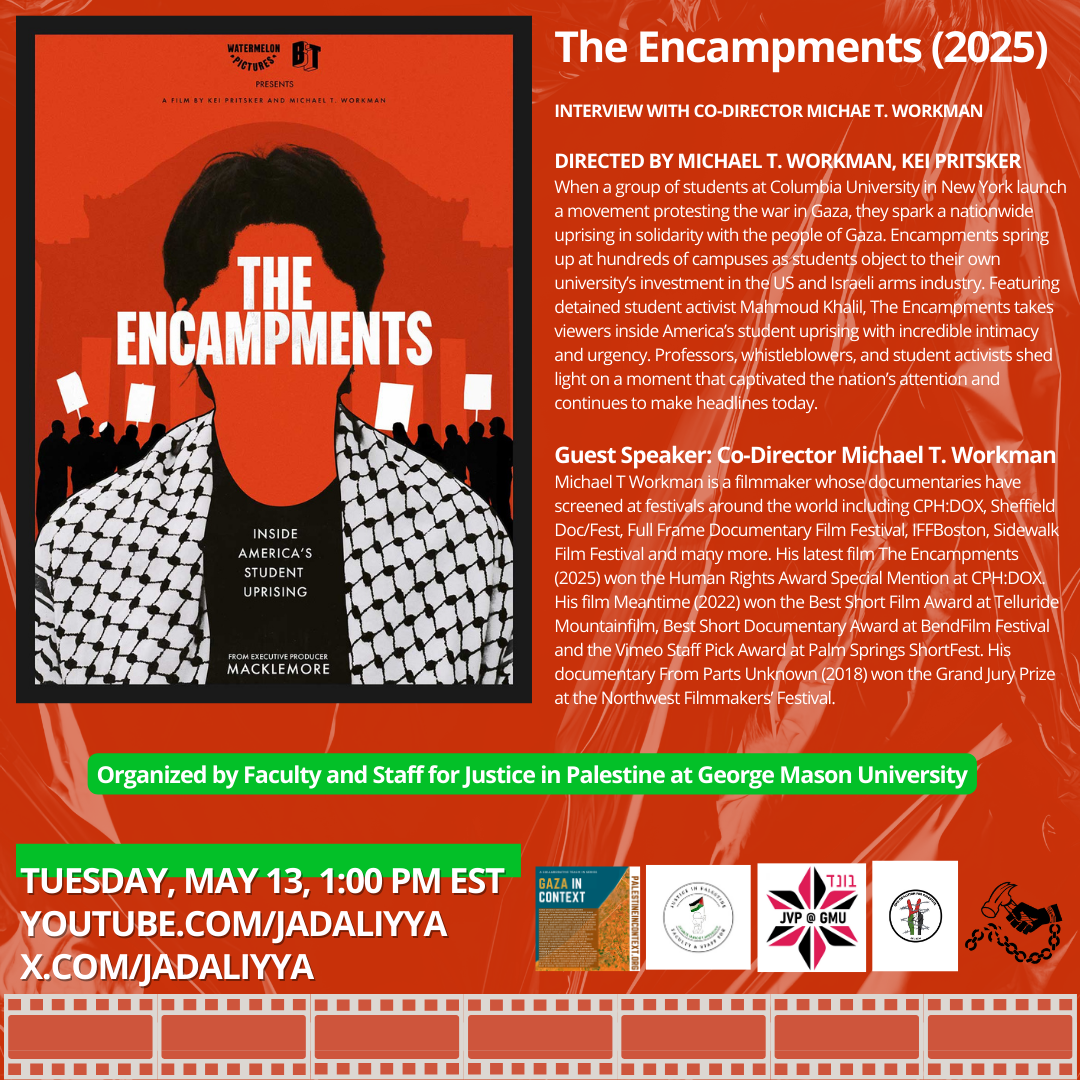Mini Film Festival (Part 2)
"The Encampments"
Tuesday, 13 May 2025 | 1:00PM ET
Featuring an interview with Director Michael T Workman
"The Palestine Exception"
Wednesday, 14 May 2025 | 5:00PM ET
Screening and Interview with Director Jennifer Ruth
Watch Here:
Youtube.com/Jadaliyya
X.com/Jadaliyya
The Encampments (2025): Directed by Michael T. Workman, Kei Pritsker
When a group of students at Columbia University in New York launch a movement protesting the war in Gaza, they spark a nationwide uprising in solidarity with the people of Gaza. Encampments spring up at hundreds of campuses as students object to their own university’s investment in the US and Israeli arms industry. Featuring detained student activist Mahmoud Khalil, The Encampments takes viewers inside America’s student uprising with incredible intimacy and urgency. Professors, whistleblowers, and student activists shed light on a moment that captivated the nation’s attention and continues to make headlines today.
The Palestine Exception (2024): Directed by Jennifer Ruth and Jan Haaken
After years of right-wing assaults on higher education, attacks took a new form in 2023 and 2024 that has been described as the new McCarthyism. As students across the country organize protests against Israel’s war on Gaza, decades-long taboos in academia around criticism of Israel–the “Palestine exception”–are shattered. This film features professors and students as they join calls for a ceasefire and divestment from companies that do business with Israel and face waves of crackdown from administrators, the media, the police and politicians. Scholars from diverse disciplines explain what is at stake in these protests and why so many young people identify with the Palestinian cause. The documentary unfolds as a story of college campuses as sites of both rebellion and repression, places where personal and collective histories converge in unexpected ways.

Featuring:
Michael T Workman is a filmmaker whose documentaries have screened at festivals around the world including CPH:DOX, Sheffield Doc/Fest, Full Frame Documentary Film Festival, IFFBoston, Sidewalk Film Festival and many more. His latest film The Encampments (2025) won the Human Rights Award Special Mention at CPH:DOX. His film Meantime (2022) won the Best Short Film Award at Telluride Mountainfilm, Best Short Documentary Award at BendFilm Festival and the Vimeo Staff Pick Award at Palm Springs ShortFest. His documentary From Parts Unknown (2018) won the Grand Jury Prize at the Northwest Filmmakers’ Festival.
Jennifer Ruth is a professor in the School of Film at Portland State University. She writes extensively about academic freedom and higher education in outlets such as The New Republic, Truthout, Academe, Chronicle oft’s Not Free Speech: Race, Democracy, and the Future of Academic Freedom (Johns Hopkins, 2022) with Michael Bérubé. She served two years as the faculty editor of The Journal of Academic Freedom and three years as Portland State-AAUP’s Vice President of Academic Freedom and Grievances. She holds a Ph.D. from Brown University.
Organized by Faculty and Staff for Justice in Palestine at George Mason University, and cosponsored by Jewish Voices for Peace at GMU, Prison Labor Justice Collective, GMU Coalition for Palestine and Gaza in Context Project.
Co-Organizers: Arab Studies Institute, Georgetown University’s Center for Contemporary Arab Studies, George Mason University’s Middle East and Islamic Studies Program, Rutgers Center for Middle Eastern Studies, Birzeit University Museum, Harvard’s Center for Middle Eastern Studies, Brown University’s Center for Middle East Studies, University of Chicago’s Center for Contemporary Theory, Brown University’s New Directions in Palestinian Studies, Georgetown University’s Center for Muslim-Christian Understanding, Simon Fraser University’s Centre for Comparative Muslim Studies, Georgetown University-Qatar, American University of Cairo’s Alternative Policy Studies, Middle East Studies Association’s Global Academy, University of Chicago’s Center for Middle Eastern Studies, CUNY’s Middle East and Middle Eastern American Center, University of Illinois Chicago’s Arab american cultural Center, George Mason University’s AbuSulayman’s Center for Global Islamic Studies, University of Illinois Chicago’s Critical Middle East Studies Working Group, George Washington University’s Institute for Middle East Studies, Columbia University’s Center for Palestine Studies, New York University’s Hagop Kevorkian Center for Near Eastern Studies, Security in Context
